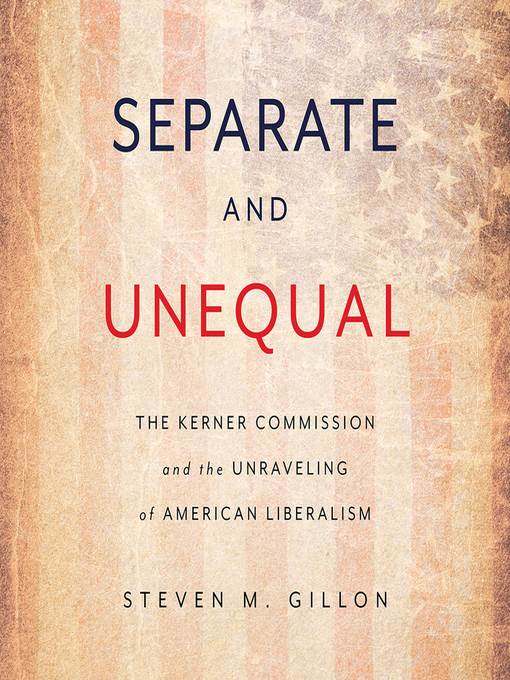
Separate and Unequal
The Kerner Commission and the Unraveling of American Liberalism
فرمت کتاب
audiobook
تاریخ انتشار
2018
نویسنده
Ryan Vincent Andersonناشر
Hachette Audioشابک
9781478999973
کتاب های مرتبط
- اطلاعات
- نقد و بررسی
- دیدگاه کاربران
نقد و بررسی

January 1, 2018
An eerily timely account of the National Advisory Commission on Civil Disorders, better known as the Kerner Commission.In 1967, President Lyndon Johnson hurriedly appointed the high-profile commission in response to widespread race-based unrest around the country, especially in Detroit and Newark. Like many former presidents who announced advisory groups, Johnson sought to offer the appearance of concern without having to concretely address the unrest. The president hoped the commission would delay any report until after the 1968 presidential campaign. However, pushed by commission staff lawyers as well as members John Lindsay, the mayor of New York City, and Sen. Fred Harris, a detailed, scathing report about white degradation of black urban areas quickly became reality. Gillon (History/Univ. of Oklahoma; Pearl Harbor: FDR Leads the Nation into War, 2011, etc.), a resident historian for the History Channel, describes the many internal controversies of the commission using authoritative details and lively prose. He also goes beyond the inner workings to demonstrate how the commission helped countless Americans better understand the alarming realities of nationwide racism. The public awareness of the report emerged the same week as the assassination of Martin Luther King Jr., and the convergence of those two events meant an unexpectedly intense focus on racism throughout the country. With the reality of systemic racism finally recognized among prominent white Americans, it appeared that African-Americans could feel safer about speaking truth to power without sounding like overzealous radicals. Gillon's research about the Kerner Commission, bolstered by hours of interviews with the surviving members, is extremely well-documented and also offers the feel of being ripped from today's headlines. "The report's most important legacy," writes the author, "was its willingness to acknowledge the role of white racism in creating the conditions that sparked the riots....Unfortunately, despite all the progress that has been made over the past five decades, many of those same conditions still exist."Well-rendered popular American history that also speaks to present-day issues.
COPYRIGHT(2018) Kirkus Reviews, ALL RIGHTS RESERVED.

February 15, 2018
Racism remains a deeply troubling aspect of American history and culture, and Gillon's (history, Univ. of Oklahoma; The American Paradox) excellent history of the 1967-68 National Advisory Commission on Civil Disorders, more popularly known as the Kerner Commission, provides historical insight on today's political climate. The author, a scholar-in-residence for the History Channel, describes how the riots that took place in Los Angeles, Detroit, and Newark, NJ, in mid-1960s spurred President Lyndon Johnson to create the Kerner Commission in an attempt to investigate the causes of these uprisings and recommend ways to avoid future occurrences. Gillon presents a smoothly crafted assessment of the commission and its recommendations, such as expanding aid to African American communities, most of which were not followed by Johnson. The author notes how, in many respects, the commission represented one of the last efforts to promote the federal government as the solution to social problems. The conservative movement was already growing in popularity by 1968, and any discussion of further government expansion into the social realm was becoming less popular with an America that was stymied by the Vietnam War and Great Society programs. VERDICT An exceptionally well-researched and timely history that belongs on the shelves of public and academic libraries.--Ed Goedeken, Iowa State Univ. Lib., Ames
Copyright 2018 Library Journal, LLC Used with permission.

February 12, 2018
In this solid political history, Gillon, historian at the History Channel, provides the inside story of the Kerner Commission—the group assembled by President Lyndon Johnson to present an unsettled nation with an authoritative report on the race riots of 1967. In an accessible narrative, Gillon provides a thorough examination of the commission: the selection of its members, how its work would be organized, Johnson’s political interference, and the various debates among commissioners. Gillon also recounts the political motivations behind the commission’s formation, describing how Johnson aimed to “kick the issue of urban violence down the road” and eventually obtain an endorsement for his Great Society programs. Remarkably, the final report bluntly and provocatively blamed white racism for the riots; it starkly detailed the wretched conditions of African-Americans in the country’s poor urban areas—substandard housing, unemployment, underfunded education, rampant police brutality—and highlighted what Gillon explains was “the deep and profound sense of rejection and alienation felt by many African Americans.” In “the last gasp of 1960s liberalism,” the report, released in 1968, forcibly and urgently asserted the need for the federal government to take a leading role in alleviating such conditions, to a higher degree than previously considered. Gillon’s thought-provoking look into the Kerner Commission provides great insight into race issues of 1960s America.

























دیدگاه کاربران